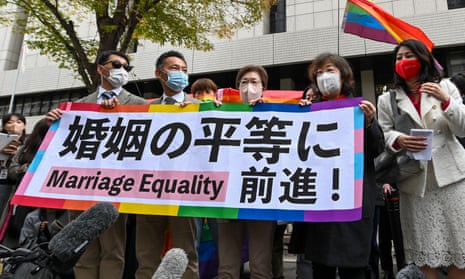A court in has ruled that Japan’s ban on same-sex marriage is constitutional, but said the lack of legal protection for same-sex couples violated their human rights, a step welcomed by equality campaigners.
Japan is the only G7 nation that does not allow same-sex marriage and its constitution defines marriage as based on “the mutual consent of both sexes”. The conservative ruling party of the prime minister, Fumio Kishida, has shown no interest in legalising same-sex marriage, although polls show a majority of voters support it.
The ruling on Wednesday by the Tokyo district court said that while the ban was constitutional, the absence of a legal system granting same-sex couples recognition as families was an infringement of their human rights.
“This is actually a fairly positive ruling,” said Nobuhito Sawasaki, one of the lawyers involved in the case. “While marriage remains between a man and a woman, and the ruling supported that, it also said that the current situation, with no legal protections for same-sex families, is not good, and suggested something must be done about it.”
The ruling had been keenly awaited because of Tokyo’s influence on the rest of Japan and came after a 2021 judgment by a court in Sapporo that found the ban on same-sex marriage was unconstitutional. A court in Osaka ruled in June that the opposite was the case, however.
Amnesty International described the Tokyo court’s decision as an “important step forward”.
Boram Jang, an east Asia researcher at the human rights NGO, added: “Nevertheless, much more needs to be done to combat the discrimination faced by LGBT people in Japanese society. It is time for the government to change course on LGBT rights.
“For years, a bill on promoting ‘understanding’ of LGBT people and preventing discrimination continues to be delayed in Japan’s parliament. The government must put in place concrete measures that end the discrimination same-sex couples and other LGBT people face in all walks of life.”
Japan does not permit same-sex couples to marry or inherit each other’s assets, such as a house they may have shared, and gives them no parental rights to each other’s children.
Though partnership certificates from municipalities cover about 60% of the population in Japan, including Tokyo, they do not give same-sex couples the same rights as heterosexual couples.
The four same-sex couples involved in the case said the ban contravened their human rights and had sought 1m yen (£6,000) in damages, a demand the court rejected.
But the plaintiffs, who unfurled a banner reading “progress towards marriage equality” outside the courthouse after the ruling, said they were encouraged.
“There were parts of this that were disappointing, but parts of it gave me hope,” said Katsu, who gave only his first name.
The decision came a day after the US Senate passed a same-sex marriage protection bill and Singapore lifted a ban on gay sex but limited the prospects for legalising same-sex marriage.
Two more cases are pending at Japanese courts, and activists and lawyers hope that additional supportive rulings will pressure lawmakers to change the system, although that is unlikely to happen soon.
The situation has restricted the talent pool for international companies, a situation that groups including the American Chamber of Commerce in Japan have pointed out in their calls for change.
“Thinking about the future of their lives, they don’t see anything in Japan. So they move to more friendly jurisdictions, like the United States,” said Masa Yanagisawa, the head of prime services in Japan at Goldman Sachs and a member of the activist group Marriage for all Japan.
“We’ve been investing into the person to have a senior role, but then they move … All that talent ends up leaving the country because of the social system.”
